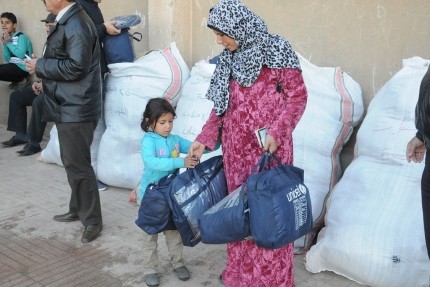
2 February 2016 – With four million Syrian and host community children in need of education and no let-up in sight in the fighting tearing the country apart, the United Nations and its partners are seeking $1.4 billion at a major conference in London on Thursday to save the current youth generation.
“The scale of the crisis for children is growing all the time, which is why there are now such fears that Syria is losing a whole generation of its youth,” said UN Children’s Fund (UNICEF) Regional Director for the Middle East and North Africa, Peter Salama, whose agency is coordinating the ‘No Lost Generation Initiative’.
“As a result of all the work being done by partners and donors, education and protection for children are now being prioritized. But what we must see in London is the step-change necessary to bring all children back to learning; to protect those who are at risk of dropping out; expand safe and inclusive learning environments; recruit and train more teachers; improve the quality of education, and support the development of technical, vocational and life skills opportunities for youth.”
The London conference is being co-hosted by Britain, Germany, Kuwait and Norway, and leaders from more than 30 countries are expected to attend, with the aim of raising new funding to meet the immediate and longer-term needs of those affected by the crisis.
Nearly five years into the Syrian war, some four million Syrian and host community children and youth aged 5-17 years are in need of education assistance, including 2.1 million out-of-school children inside Syria and 700,000 Syrian children in Turkey, Lebanon, Jordan, Iraq and Egypt.
Last year, the combined efforts of Governments and international partners helped more than one million children and youth inside Syria benefit from formal or non-formal learning opportunities. But with no political solution in sight to one of the most brutal conflicts the world has seen in decades, the number of children missing out on an education continues to climb.
Governments at the London meeting will also be urged to put more pressure on parties to the Syria conflict and those who support them to end attacks on schools and other places of learning, in accordance with international humanitarian law.
According to UNICEF, the killing, abduction and arrest of students and teachers has become commonplace, as have arbitrary attacks on schools. About one in four schools cannot be used because they have been damaged, destroyed or are being used as shelters for the internally displaced or for military purposes.
The No Lost Generation Initiative was set up in 2013. By the end of 2015 1.2 million children and youth inside Syria benefitted from improved formal and non-formal learning opportunities and more than 650,788 in Egypt, Iraq, Jordan, Lebanon and Turkey received school supplies or support through cash grants.
GAIN IS COMMITTED TO HELPING 1,000 FAMILIES WITHIN SYRIA. OUR HEARTS BREAK WITH THE DAILY REALITY MANY OF THESE CHILDREN AND THEIR FAMILIES ARE EXPERIENCING.
IF YOU WOULD LIKE TO READ MORE ABOUT OUR WORK, CLICK HERE.
Many Syrian IDPs (Internally Displaced People) first come to our partner’s building because someone tells them they can get a Bag of Blessing there. Each Bag of Blessing consists of food and non-food items. With the onset of winter, blankets and heaters were now added to each bag.
After individuals would come to the center and the volunteers and staff showed them love and kindness, the individuals usually became a part of the community. Often they kept coming, even if they no longer needed a Bag of Blessing.
Recently, a local staff member shared a story of a grandmother who first came to the center looking for aid…
“After some time, we learned that she had two little girls. They were her great-grandchildren, ages three and five. The reason why they were staying with her was because the girls came from a broken home. Their mother left them and their father did not work. They had no one to look after them. Their dad was also abusive toward the girls and it was a very bad situation.
The grandmother used the Bag of Blessing and took care of the girls. Her life was changed through that bag. I am thankful for this time because I had the opportunity to be able to see how God works through people.
She began to come every Saturday to share with me about her difficult circumstances concerning her grandchildren. At times, we were not always able to supply their needs, but I could see how God was working in her life, and how He was protecting these little kids from an abusive father.
Maybe the aid that we were able to give her gave the grandmother the strength to continue helping these little girls to have food and clothing, to grow, be healthy and warm.”
As of today, we are helping provide 1,000 families (totaling 5,000 individuals) with basic necessitites through the Bags of Blessings.
WOULD YOU LIKE TO HELP PROVIDE HOPE AND AID FOR ANOTHER PERSON SUCH AS THIS GRANDMOTHER AND HER FAMILY?
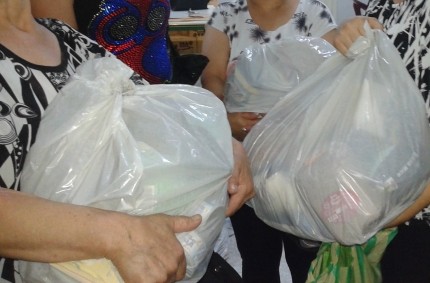
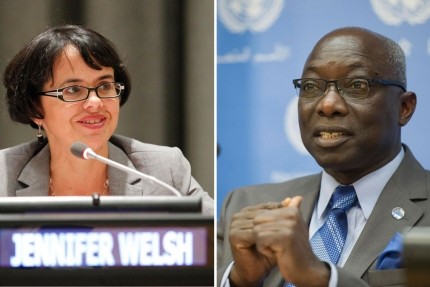
13 October 2015 – Senior United Nations human rights officials today expressed their alarm at the rise in violent rhetoric by influential religious leaders – including calls for “holy war” against certain faiths – in relation to the situation in Syria.
The UN Secretary-General’s Special Adviser on the Prevention of Genocide, Adama Dieng, and Special Adviser on the Responsibility to Protect, Jennifer Welsh, condemned the recent call by clerics in Saudi Arabia for Sunni Muslims and their States to support a “holy war” against Shia Muslims and Christians in Syria, as well as against States and non-State armed groups perceived to support them.
“Such rhetoric can aggravate the already extremely volatile situation in Syria by drawing religiously motivated fighters to join all parties to the conflict, thus escalating the risk of violence against religious communities,” said the Advisers in a statement, adding that “advocacy of religious hatred to incite or justify violence is not only morally wrong, but also prohibited under international law.”
Mr. Dieng and Ms. Welsh also expressed concern at reports that Russian Orthodox clerics had referred to the Russian participation in the conflict in Syria as a “holy battle” against terrorism, as “statements of this kind can be manipulated, feed suspicion and increase polarization of communities.”
The Special Advisers also noted the response by Russian authorities, who reportedly denied that there was any religious connotation to their involvement in Syria.
They praised the organization Syrian Christians for Peace for rejecting the concept of a Christian “holy war” and condemning those who invoke it.
The Special Advisers called on States to dissociate themselves from and condemn any form of advocacy of religious hatred, promote dialogue and protect and empower all those religious figures and human rights defenders who are working towards enhancing interreligious respect and harmony.
The officials also called on religious leaders around the world to refrain from any form of advocacy of religious hatred and incitement to violence, and to counter any use of such rhetoric, emphasizing that “religious leaders should be messengers of peace, not of war.”
“In situations in which tensions are high, as in Syria, religious leaders should call for and foster restraint and dialogue, rather than fanning the flames of hatred,” they cautioned.
If you want to read more about how GAiN is working in Syria, click here.
(Article Source)
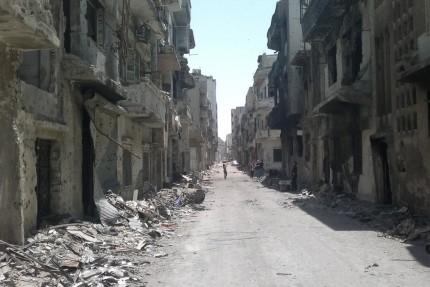
16 September 2015 – The United Nations humanitarian chief today urged the Security Council to find a political solution to end the conflict in Syria, warning its members that the fighting had created one of the largest refugee exoduses since the Second World War.
“It is civilians who continue to bear the brunt of this war,” Under-Secretary-General for Humanitarian Affairs and UN Emergency Relief Coordinator Stephen O’Brien told the Council, appealing to the 15-member body to find “a political settlement that brings an end to the crisis.”
Mr. O’Brien noted that, 18 months after the Security Council adopted resolution 2139, its demands to allow unhindered humanitarian access to the country had gone unheeded, and there had been no reduction in the appalling patterns of human rights violations.
Government forces, he said, had repeatedly attacked residential areas during between 17 and 26 August. During the last week of August, non-State armed groups had launched hundreds of shells, killing at least 20 civilians.
He warned of a “deliberate targeting of civilian infrastructure,” including water and electricity networks, as well as schools and medical facilities.
In 2014, he said, some 169 reported attacks on medical facilities occurred, and 259 medical worked were killed. Additionally, since the start of 2014, the UN has verified at least 84 attacks on or near schools.
“Today, Syria is one of the most dangerous places on earth to be a child,” said Mr. O’Brien, noting that over two million children are not in school and a further 450,000 are at risk of dropping out. He also expressed his concern that, in areas controlled by the Islamic State of Iraq and the Levant (ISIL), schools were using a curriculum designed by the terrorist group.
He also outlined the current state of humanitarian aid delivery in Syria, warning that the UN and non-governmental partners were still unable to deliver sufficient quantities of aid to the hardest-to-reach areas of the country.
Lack of funding, said Mr. O’Brien, continued to be a major challenge, and that $738 million was needed to fund essential life-saving operations until the end of 2015.
The Under-Secretary-General called on members of the Security Council to do more to demand an end to indiscriminate violence in Syria, and to ensure that humanitarian assistance is able to reach all areas of the county. Above all, he said, the Council should find a political solution to “end this nightmare” for the Syrian people.
GAIN IS PROVIDING AID TO SYRIANS WHO ARE DISPLACED WITHIN THEIR OWN COUNTRY. CLICK HERE IF YOU WOULD LIKE TO KNOW OUR RELIEF EFFORTS.
(Article Source)
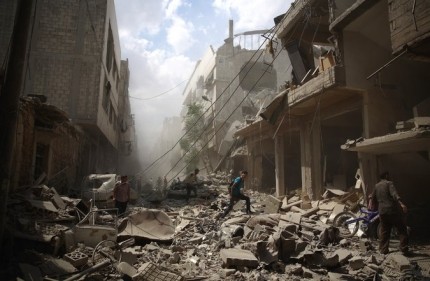
BEIRUT, Lebanon — Every morning, at the dawn call to prayer, women and children move silently from the Damascus suburb of Douma to the surrounding farm fields, seeking safety from the day’s bombardments by the Syrian government.
The walk is part of a surreal routine described by the fraction of Douma’s residents who remain: shopping on half-demolished streets, scavenging wild greens, carrying out mass burials. But not even the fields are safe; recently, medics said, bombs killed two families there — 10 people, including seven children.
As crowds of Syrians transfix the world with their flight to Europe, this kind of life is one of the many nightmares they are fleeing. They leave behind increasingly empty neighborhoods — from the Damascus suburbs to the northern city of Aleppo — that testify to the scale of their exodus.
Such bombardments have been going on for years in insurgent-held areas like Douma, one of the first areas to revolt against the government in 2011. And yet, the situation can still get worse. The past month in Douma made that clear.
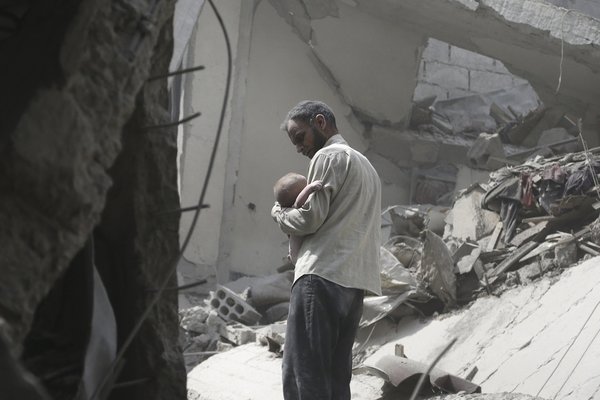
Government forces began a barrage even more intense than usual, using not only the artillery shells that Douma has come to expect, but also airstrikes. Perhaps four out of five residents had already fled what was once a bustling community of around half a million, and emergency workers say the new bombings drove out thousands more.
More than 550 people, mostly civilians, have died in the past month in Douma and nearby suburbs, 123 of them children, Red Crescent medics say. August was one of the bloodiest months in the district, with at least 150 trauma injuries being treated each day from Aug. 12 to 31 — a number that includes only patients from 13 makeshift clinics that work with Doctors Without Borders.
Such concentrated violence has shaken even the most steadfast holdouts, said Ahmed, a Douma resident and a paramedic in his 20s who asked to be identified only by his first name for his safety. Of those who remained in early August, half have fled, he said, while the rest trek daily to hide in the fields or stay “trapped at home, praying they won’t get killed.”
As international focus has shifted to the Islamic State’s highly publicized violence and the threat it poses beyond Syria, less attention has been paid to the original struggle between President Bashar al-Assad and the insurgent groups that rose up after the crushing of a protest movement in 2011.
But that earlier conflict was driving people from their homes long before the Islamic State existed in its current form.
Advocacy groups for the Syrian opposition, as well as international watchdogs like Human Rights Watch, have long contended that the security forces’ bombardment of insurgent-held areas like Douma takes the largest toll on civilians, killing far more people than the Islamic State. Although no definitive numbers exist, a tally by a Syrian civilian opposition group, the Violations Documentation Center, said that 18,000 had been killed by airstrikes, which only the government has the ability to carry out, and that more than 27,000 had died in shelling and rocket attacks by all sides.
The Syrian government says it is bombing terrorists.
Douma, like other poorly served cities around Damascus, rose up early, and many there took up arms. It is now a stronghold for the Army of Islam, an insurgent group. The Nusra Front, Al Qaeda’s arm in Syria, is also active there, while the Islamic State is not known to play a role.
Insurgents also use indiscriminate tactics. After the new wave of attacks in Douma, they shelled Damascus, killing at least 20 people, according to death notices on pro-government websites. No one claimed responsibility.
But in terms of scale, the government’s bombing of rebellious areas is on another level. It has laid waste to large sections of central Homs in western Syria, Aleppo and the Damascus suburbs. In Aleppo, the weapons of choice are shrapnel-packed barrel bombs, unguided and dropped from helicopters.
In the past month, more than 450 civilians died from government bombings in East Ghouta, a semicircle of opposition-held working-class towns around Damascus, according to lists kept by the local branch of the Syrian Arab Red Crescent. Many of the victims were in Douma, the group said, including elderly people, women and children.
But it is not just bombings that deform life in Douma. Years of government blockades have forced residents to depend on tunnels and smugglers for daily goods. Humanitarian aid is largely blocked, and few people can get in or out.
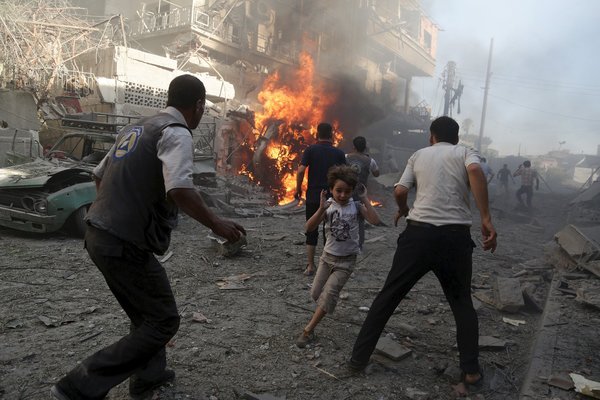
Government and opposition fighters alike take their cuts of bribes and smuggling revenues. Some insurgents act as warlords, enriching themselves and cracking down on dissent. The human rights lawyer Razan Zeitouneh and other secular opposition activists disappeared from Douma in 2013, believed to have been kidnapped after criticizing the Army of Islam.
So escape means dealing with smugglers and new risks, even for those who have no plans to take a boat on the Mediterranean. It begins from the moment of leaving one’s own block, on the way to Damascus.
“It’s completely normal for people to wish they can go overseas,” Ahmed, the paramedic, said. But, he added, “Can they?”
Those who do reach Damascus — joining seven million Syrians displaced within the country — can be harassed or even arrested by security forces suspicious of people from opposition areas.
That drives many to Lebanon, Jordan or Turkey, which host most of the four million Syrians officially registered as refugees abroad. The Damascus suburbs have hemorrhaged 165,000 people to Lebanon alone. But those countries have become less hospitable, with residency crackdowns and shrinking benefits. So refugees can go further afield, including to Europe. Or they can go back to Douma, and to a war that has killed a quarter of a million Syrians. Because of the siege and restrictions on journalists by combatants, life there can only be glimpsed on videos posted by insurgents, anti-government activists and rescue workers. They show streets engulfed by uneven piles of brick, rooftops tilted askew and steel reinforcement bars pulled apart like spaghetti.
In one recent clip, a volunteer — perhaps a teenager — slung over his shoulder the limp body of a small boy. In another, a slight youth dug a ragged, bloody corpse from under rocks until a voice behind him says, “Don’t film the body. Enough.”
Often, amid the search for survivors, there is no sound but the crunch and clink of rubble, and residents manage to utter just one sentence, “God is greater.”
“Neighborhoods fell on the heads of the residents,” Imad al-Din, a Douma resident, said recently over Skype. “The screaming can still be heard.”
“Black Sunday” is what Douma residents call Aug. 16. At least 122 people died in one of the war’s deadliest air attacks, on a vegetable market, according to rescue officials, the Syrian Network for Human Rights and other monitoring groups.
Bilal Abu Salah, a resident who left the market just before the strike, is haunted by the faces of the pushcart vendors who sold him cucumbers, zucchini and eggplant. Minutes later he saw one covered with blood; one died, two were seriously injured.
Dr. Adnan Tobaji operated in a makeshift basement clinic, sometimes on the floor, without anesthetic or sterile supplies. Shortages could be deadly, he said. One woman died waiting for a blood bag to arrive.
The new attacks have gutted Douma’s meager remaining street life and local institutions. Nine civil defense workers were killed. The local authorities imposed a curfew and even canceled Friday Prayer.
Douma’s free fall has prompted Dr. Tobaji and several hundred colleagues and residents to sign a petition calling for a complete humanitarian truce, hoping it spurs talks and ends the war.
The call is striking coming from rebellious Douma. It sets no preconditions for the fate of Mr. Assad, long a sticking point.
“The fate of Assad for us is nothing compared to the fate of Syria the country, the people and the children,” Dr. Tobaji said. “At this moment while we are talking a Syrian is being killed. We need a solution by any means to stop the fighting.”
The solution, he added, “might not suit me or many other people but it’s not for me or for this or that person. It’s for Syria.”
GAIN IS PROVIDING AID TO SYRIANS WHO ARE DISPLACED WITHIN THEIR OWN COUNTRY. CLICK HERE IF YOU WOULD LIKE TO KNOW OUR RELIEF EFFORTS.
(Article Source)
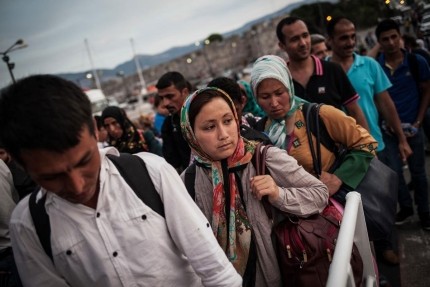
9 July 2015 – The exodus spawned by the four-year long Syrian conflict has now become the United Nations refugee agency’s largest crisis in almost a quarter of a century and risks deteriorating even further as fighting in the country shows no sign of abating.
In a news release issued earlier today, the Office of the UN High Commissioner for Refugees (UNHCR) confirmed the latest figures received from the field indicating that more than 4 million Syrian refugees have fled the Middle Eastern nation since hostilities began there in March 2011.
“This is the biggest refugee population from a single conflict in a generation,” lamented UN High Commissioner for Refugees António Guterres. “It is a population that deserves the support of the world but is instead living in dire conditions and sinking deeper into abject poverty.”
As it reaches the mid-point of its fifth year, the Syrian civil war has generated a steady outflow of refugees into neighbouring countries such as Lebanon, Turkey, Iraq and Jordan, burdening those countries’ infrastructures and leading to overcrowded settlements where many refugees struggle amid high unemployment and precarious services.
According to the latest data available, Turkey alone is host to over 1,800,000 registered Syrian refugees – more than any other in the world – with about 259,000 living in 23 camps set up and managed by the Government.
In addition, the numbers are only slated to increase amid intensified fighting across Syria, the UN refugee agency noted. Today’s 4 million milestone, in fact, comes barely 10 months since the total of three million was reached.
At the same time, however, life for Syrians in exile is becoming increasingly tough. The UN agency explained that some 86 per cent of refugees outside Jordanian resettlement camps live below the poverty line. In Lebanon, 55 per cent of refugees live in shelters considered to be “sub-standard.”
Meanwhile, in a recent report from the ground, the UN Children’s Fund (UNICEF) similarly warned that as the Syrian crisis has dramatically reduced family livelihood opportunities and impoverished millions of households in the region, children have been steadily pushed into the job market and are now being widely employed in harmful working conditions, risking serious damage to their health and wellbeing.
“Worsening conditions are driving growing numbers towards Europe and further afield, but the overwhelming majority remain in the region,” Mr. Guterres continued. “We cannot afford to let them and the communities hosting them slide further into desperation.”
While the conflict continues to push a steady outflow of Syrians across the region, the conditions of those trapped inside the country’s besieged cities remains equally dire.
The UN’s Office for the Coordination of Humanitarian Affairs (OCHA) has cautioned that some 12 million people in the Middle Eastern country today remain in need of humanitarian assistance – a twelve-fold increase since 2011. 7.6 million people have been displaced by the conflict and another 4.8 million people are in need of humanitarian assistance in hard to reach and besieged locations.
The humanitarian impact of the crisis is only further compounded by funding shortfalls which has seen wholesale cuts to the UN’s delivery of humanitarian aid – from food assistance to lifesaving health services.
IF YOU WOULD LIKE TO KNOW ABOUT GAIN’S WORK IN SYRIA, CLICK HERE.
(Source)
